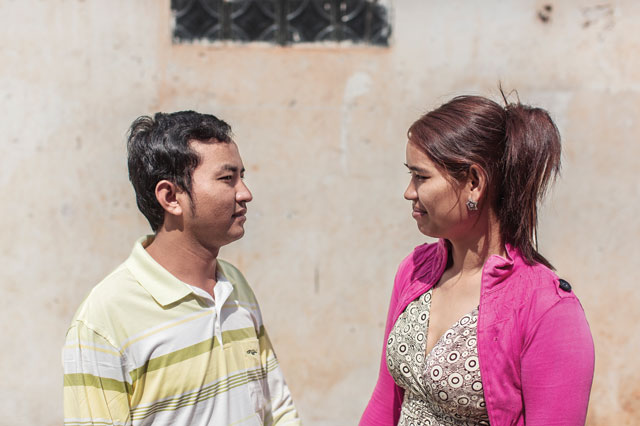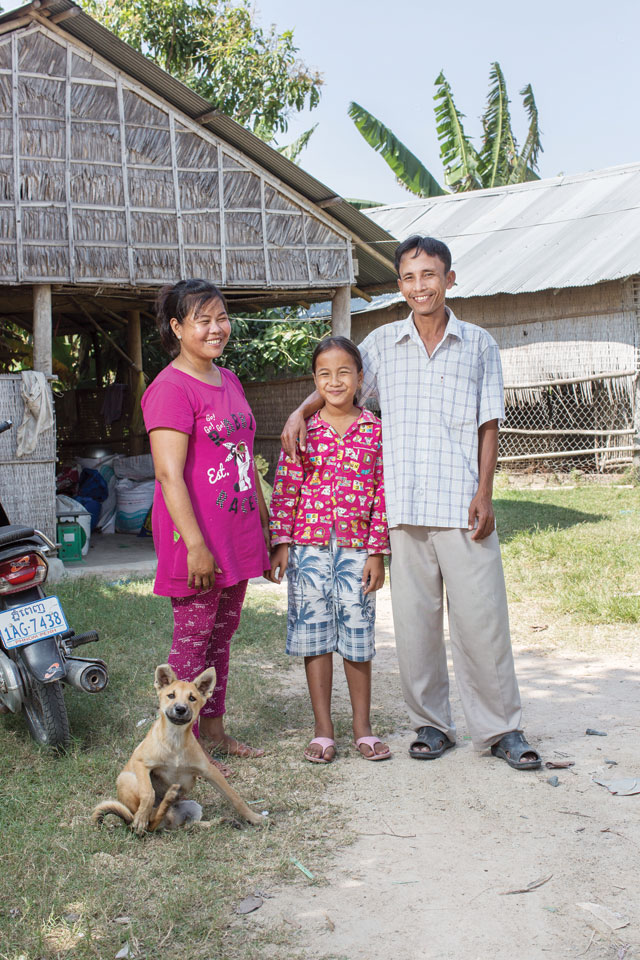At SL Factory in Phnom Penh, young women sort through piles of blue jeans; their colourful clothes strike a contrast against the steel tables and grey walls. Down a corridor, geysers of steam erupt from massive steel washing machines. Pairs of young men wheel plastic carts of soggy garments, some eventually to be sold in Gap and H&M stores around the world, to the drying room.
A man stares into the distance, his mind thick with imagination. Behind him, sheets of scalding water begin to leak from the metal hatch of his washing machine. He jumps and hits a button to release the pressure.

It was workers such as these who joined a nationwide strike that began last December 25 when the Cambodian government announced the minimum wage for garment factory workers would be raised to $95 per month – a figure well below the desired $160. On January 3, the day after workers rejected a further increase to $100, Veng Sreng Boulevard, a major factory area on the outskirts of the capital, was drenched in protest. The crowd was met by military police dressed in black exoskeletons of thick body armour. The mass of people moved like white-water rapids, bubbling and spitting beneath walls of smoke grenades. By the end of the day, four protesters had been shot dead by police.
When her parents saw the affection that had grown between Onn and Sokunthea, they relented and the couple married in 2000.
Despite the violence and labour disputes, for many Cambodian school-leavers, joining the 400,000-strong factory workforce is their best option. They travel to urban centres to become part of an industry that accounts for 80% of Cambodia’s exports. Most garment workers are between the ages of 18 and 25 and are living away from home for the first time. For many, it is a coming-of-age; a time away from the formal strictures of traditional life in the provinces. For others, it is a time they meet and fall in love with their future partners.

Sokunthea and Onn met in 1996 while working in the factories. Back then their basic wage was $40 per month. They lived next door to each other in a warren of single-room accommodations – typical of the bustling manufacturing district that surrounds Veng Sreng
Boulevard on the outskirts of the capital. Onn saw Sokunthea in the evenings and on Sundays returning from the market. He fell in love.
Full of nerves and barely able to construct a sentence, he asked her if she felt the same. She was unsure. He was eight years her junior. Onn was knocked back. His chances deteriorated even more when Sokunthea asked her parents. They declared Onn too poor and too young for her to marry.
Later that year, Sokunthea was returning home after a late shift. The sounds of children squealing and barking dogs echoed in the dark alley. Then several men surrounded her. The sharp smell of alcohol emanated from their twisted, drunk faces.
“You’re poor, you will have sex for just one dollar,” they jeered. Sokunthea tried to push past but they formed a wall of sweaty muscle. “Sex for one dollar,” they repeated. One man dangled a soiled note in front of her face. Then he was shoved to one side and Sokunthea felt the firm grip of a hand on hers. It was Onn. Glaring at the men, he escorted her home. That night, he slept outside her door.
As they grew closer, Onn began to present himself at Sokunthea’s family ceremonies and weddings, offering to serve drinks and food. After a few occasions, Sokunthea felt free enough to approach him. “Dance next to me,” she said. When her parents saw the affection that had grown between Onn and Sokunthea, they relented and the couple married in 2000.
When Sokunthea fell pregnant, the couple bought a small plot of land in a village in Takeo province with the help of a hefty bank loan. Onn invested in a rice-milling business, and he and Sokunthea now struggle to work the grains to pay off their loan at a rate of $200 per month. Over steaming bowls of homemade sour soup, they say they plan to open a restaurant when their loan is settled.
Preap and Mom also met while living in a crowded garment factory neighbourhood. It was 2009, and the minimum wage had been raised to $60 per month. Preap cut patterns from giant ribbons of cloth while Mom worked at the sewing machines. They met in an alley among chickens and toddlers. Preap was rapt. “I thought she was lovely in every way, I still do,” he says over lunch.
The couple began exchanging shy greetings when they passed each other in between shifts. After a little while, during a conversation on a day when the dry-season dust made everything sepia-tinted like photos of the Wild West, Preap asked for Mom’s number. She was worried about gossip spreading among neighbours and glanced over her shoulder as she recited the digits. For the sake of decorum, the couple avoided meeting in public. They cemented their relationship by talking every evening on the phone
After a year of pillow talk in their separate apartments, the couple had their families meet. Soon both fathers were drinking rice wine in the shade of palm trees while the women chatted, passing toddlers and periodically lobbing dried rice at squabbling hens. The families consentedand the couple married in 2012. “He is a good man and we have similar interests,” Mom says. They plan to have children in 18 months, when they have saved enough money to move to the countryside

It was working in a stockroom piled high with mountains of jeans and hoodies that That first spied his future spouse. He liked what he saw. A bit later, when he saw Pthy in the lunchtime crowds, he shoved his way towards her. It was a bold move to offer her his phone number in front of all their colleagues. Pthy looked at the scrap of paper and was horrified. Who was this man? Why would he embarrass her like this? She took the number so he wouldn’t lose face but hoped she would never see him again.
As the factory days wore on, repetitive as the motion of the needle on her sewing machine, Pthy’s thoughts found their way again and again to the man who had embarrassed her. As she walked home through the truck-churned dust of Veng Sreng Boulevard, Pthy asked her friends if any of them knew the man’s family. They told her his family had a shop nearby and a good reputation. Later that evening, Pthy dialled the number. That picked up. She told him that if he loved her then he had to meet her parents. Both families agreed to the match and the couple married within the year.
Sitting on the floor of That’s family’s shop, That says he “loves everything about her” while Pthy says she appreciates her husband’s character and how respectful he is. She tells me that many of her friends fall in love while working at the factory; they either partner up with men who work there or are introduced to the male relatives of their co-workers.
Yet life remains tough. Pthy says she pays $100 per month to buy milk for her two-month-old son. She can’t breastfeed him because she works such long hours. Her two-year-old daughter also needs $64 for food per month, which is more than half of the couple’s combined salary. Both children live with relatives in the provinces.
As the factory owners, union bosses and buyers exchange deals and threats trying to resolve the problems plaguing Cambodia’s garment industry, workers such as That and Pthy continue to live their lives in the cracks of time between shifts. As the song of the sewing machines drones on, they dream of returning to the life they left behind in the villages.
